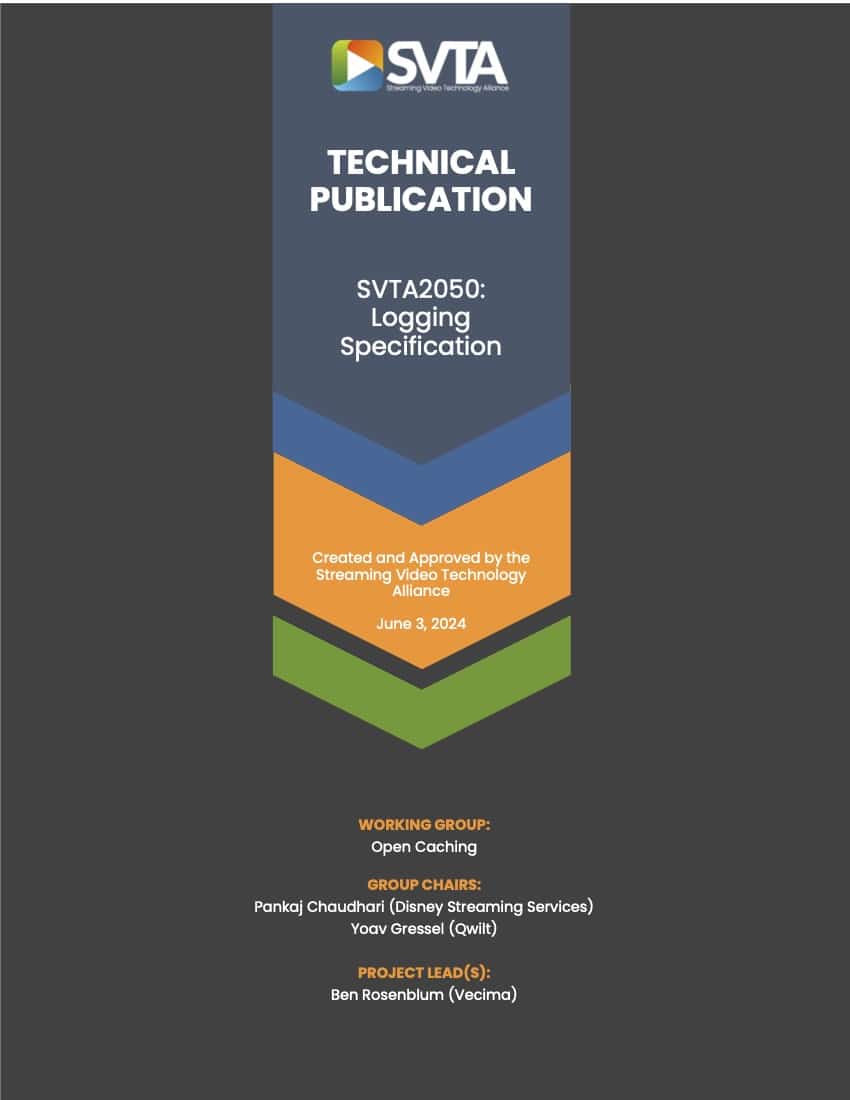Open Caching Logging Specification
Project Status:
(roll over for info)
Completed
The project has been completed.
Start:
Estimated Completion:
- Home
- Open Caching Logging Specification
Problem Statement
Project Description
Project Type
Project Leads
Advisors
There are no SMEs associated with this project.
Published Documents
SVTA2050: Open Caching Logging Specification
This document describes extensions to the Open Caching Configuration API and the Content Delivery Networks Interconnection (CDNI) Footprint & Capabilities Interface [RFC8008] to support configuration and advertisement of logging capabilities, along with examples and best practices to support logging,log record transformation and transmission between participants within an Open Caching environment. The extensions are based on the Internet Engineering Task Force (IETF) CDNI Request for Comments (RFCs) and extensions proposed by this Streaming Video Technology Alliance (SVTA) group.
Goals and Objectives
- Provide a framework for communication of CDN request logs between Open Caching participants to satisfy billing and operational requirements.
- Clarify and extend missing functionality from the CDNI Logging Interface defined in RFC 7937.
- Allow batch push and streaming modes of operation in addition to the pull mode described in CDNI.
- Provide useful default and minimal configurations for the most common use cases, but allow custom configuration when the pre-defined configurations are not suitable.
Project Scope
- Extensions to the pull mode of operation described in RFC7937
- Log container/file formats
- ELF
- JSON
- Newline delimited records (\n, \n\r)
- Archive containers (tar) containing other log files
- Log record fields
- Standard log record types
- A standard log record type is a combination of a set of fields in a defined textual format (JSON, CSV, or whitespace delimited).
- A ‘minimal’ type optimized for data size, including only the fields necessary to perform billing functions.
- A ‘standard’ type with a set of fields likely to be useful for operational monitoring.
- An ‘extended’ type with an exhaustive field set likely to cover most operational and troubleshooting use cases.
- Field transformations to support obfuscation, truncation, hashing, and encryption operations
- Optional custom request and response header field inclusion
- Logging transports supporting both push and pull modes of operation
- S3
- SFTP
- Kafka
- Generic custom transport
- Aggregation
- Filtering
- Auth
- Custom container formats
- Custom log record formats
- Custom field definitions
Contributors
The following members have contributed to this project. Click on their name to visit their profile. If they have not published their profile, the link will redirect to their LinkedIn profile.
Additional References
- [OC-LIFS] SVTA Open Caching Logging Integration Functional Specification (2017)
- [RFC7937] Content Distribution Network Interconnection (CDNI) Logging Interface
- [RFC8006] Content Delivery Network Interconnection (CDNI) Metadata
- [RFC8008] Content Delivery Network Interconnection (CDNI) Request Routing: Footprint and Capabilities Semantics
- [RFC4287] The Atom Syndication Format











